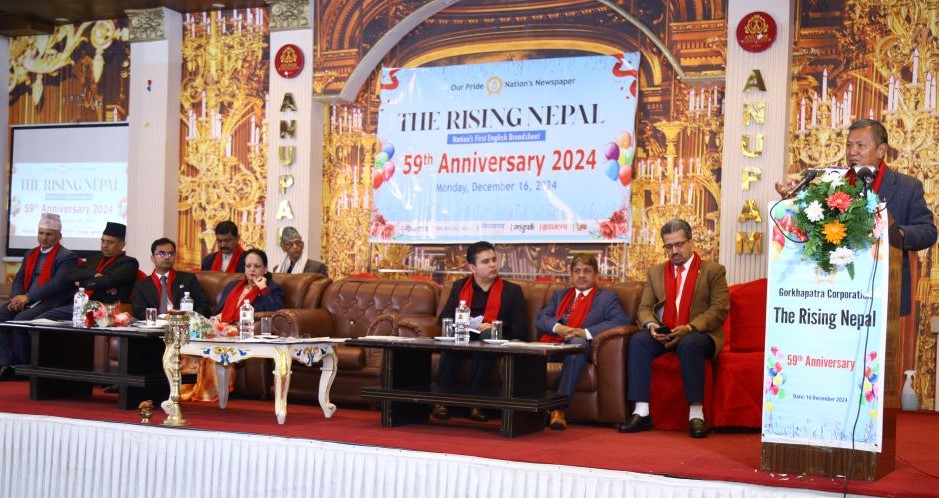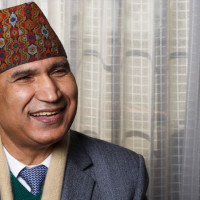- Tuesday, 17 December 2024
Good governance govt priority: Minister Gurung
By A Staff Reporter,Kathmandu, Dec. 17: Minister for Communication and Information Technology, Prithvi Subba Gurung, emphasised that the government’s primary goal is to establish good governance. He made this statement while addressing a special function organised to mark the 59th anniversary of The Rising Nepal daily in Kathmandu, on Monday.
Minister Gurung, who is also the government spokesperson, highlighted that political stability can be achieved only through good governance, and that development initiatives can progress meaningfully only if the government is stable.
He stressed the need for major political parties to unite in the quest for good governance, noting that the current coalition government comprising the Nepali Congress and CPN-UML has been formed with the same objective in mind.
The Minister further underscored that increasing capital expenditure remains a top priority of the government. He assured that the administration is advancing efforts to address public demands effectively.
"The primary agenda of the current government is to establish good governance," he said. "If good governance is achieved, it will pave the way for both political and governmental stability."
He added that political stability ensures a conducive environment for governance, remarking that unity among major political parties is a prerequisite for such stability. "By forming a coalition government of the Congress and UML, we have taken significant steps towards delivering good governance. We've ended the chaos akin to the 'weighing of frogs in a scale'—a metaphor for unmanageable political disorder. Today, the agenda of good governance and increased capital expenditure tops our priorities. We are working responsibly to address the needs of the people," he affirmed.
Minister Gurung also acknowledged the necessity of revising governmental working procedure to align with present-day demands, including seeking external financial assistance where required. He reported that the government has been successful in increasing the nation’s revenue under its tenure.
He also said that the present government is more responsible and accountable to the public and their concern. "We are here to end the public's frustration and negative feelings towards the government," he said.
Minister Gurung also remarked that the Gorkhapatra and all its publications should be the state's papers of all 761 governments including 753 local governments, seven provinces, and one central-level government in Singha Durbar. Minister Gurung, however, stressed that the contents of the newspapers, both The Rising Nepal and Gorkhapatra, should be of the same professional standard and meet the requirements of every government.
On the occasion, the Minister vowed to elevate state-run media outlets above their private counterparts by ensuring credibility and quality. "There is public trust that state-owned media present unbiased and truthful information. Building on this trust, these institutions must strive to outperform others," he remarked.
Minister Gurung also said that since he came to handle the Ministry, he started knowing the importance of the state-owned media and the rising concern of the entire media sector. "That's why, the Ministry has focused its attention on either bringing a new Act and rules or amending the old-age media acts which are in effect since Panchayat and even Rana era in the Nepali media," he said. Within a year, the government would issue several media laws including for the government media, Minister Gurung said.
"The Rising Nepal must refine and professionalise itself in line with the needs of the nation, people, society, and today's market," said Minister Gurung.
Minister Gurung directed that the publications of the Gorkhapatra Corporation, including Gorkhapatra daily itself, be made competitive and readable in line with the times.
He emphasised that the credibility of government media depends on balanced news, and accordingly, it must work to stand out in the market.
He committed that the government would provide necessary support to ensure these media remain strong and relevant, while maintaining professionalism.
He also mentioned that the government would assist in improving the physical infrastructure and human resources of government media.
The Minister assured that the Ministry is working on career development for employees, and a new set of regulations would be introduced soon. He discussed the government's mission to maintain political stability, noting that political stability is key to sustainable development and progress.
He further stated that in order to face the current challenges, it is essential for the corporation to remain strong and competitive in the evolving media landscape. The Ministry is working within budget constraints to strengthen government media.
Minister Gurung expressed his satisfaction at having the responsibility of the ministry overseeing the journalism sector, and he mentioned his enjoyment in finding solutions amidst challenges.
He informed that the Ministry has started drafting new laws for government media, including the Postal Services and Gorkhapatra Corporation.
Secretary of the Ministry, Radhika Aryal, highlighted that the publications of Gorkhapatra Corporation have not only informed the public but have also contributed significantly to the development of language, literature, and culture. She observed that the growth of information technology has erased geographical barriers to information dissemination, while also posing challenges to traditional media through the rise of new media. Gorkhapatra’s publications, she noted, continue to serve readers and listeners worldwide linguistically and culturally. Bishnu Prasad Subedi, Executive Chairman of the Gorkhapatra Corporation, said that the corporation is in the process of digitising its publications.
He expressed confidence that under the Minister's tenure, the corporation would receive a new building, and preparations are already underway. He thanked the Ministry for its ongoing support in upgrading the institution. Lal Bahadur Airi, General Manager of Gorkhapatra Corporation, expressed gratitude to everyone who contributed to its success. He encouraged the entire Gorkhapatra family to contribute to the professional development of The Rising Nepal and Gorkhapatra.
He also highlighted the corporation’s welfare fund and career development initiatives for employees. He expressed confidence that both the corporation's management and the Ministry are seriously working on bringing new regulations for the institution.
In a programme chaired by Bhimsen Thapaliya, Acting Editor-in-Chief of The Rising Nepal, Managing Editor Parameshwar Devkota delivered welcome remarks. Concluding the event, Editor-in-Chief Thapaliya highlighted that The Rising Nepal has always prioritised public trust and focused on covering news related to the government, state, and society in all aspects.
He also mentioned that the daily has been consistently stressing the production and writing of news that appeals to readers both within the country and abroad.
Professor and former Chief Editor of The Rising Nepal, P. Kharel, acknowledged the role of The Rising Nepal in promoting Nepal globally. He noted that Public Service Broadcasting (PSB) must align with global practices and suggested that the institution could also be included under PSB. Having worked at the institution for 22 years, he offered his best wishes for the continued success of its publications.
The event was attended by Shiva Kumar Bhattarai, Acting Chief Editor of Gorkhapatra daily, Acting Deputy General Manager Yam Prasad Kandel, Minister's advisor Dr. Shaligram Parajuli, members of the Gorkhapatra board, economic department head Raju Kumar Mahat, former chief editors of The Rising Nepal Shyam Bahadur KC, editors of monthly publications, heads of digital publications, department heads, as well as journalists and employees from the institution.















